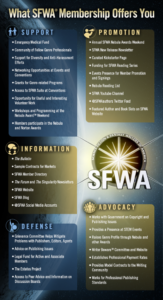 In light of recent discussions, I wanted to jot down a few things that come to mind when what I think about SFWA has to offer game writers, because there’s actually quite a bit.
In light of recent discussions, I wanted to jot down a few things that come to mind when what I think about SFWA has to offer game writers, because there’s actually quite a bit.
- Access to SFWA promotional resources includes a number of venues quite suitable for publicizing games. Our curated Kickstarter page, the New Release Newsletter (which can easily be expanded to include games), the SFWA blog, SFWA’s presences on Facebook and Twitter. It’d be easy to make the Featured Book section a Featured Work section to go with Authors section on the SFWA website.
- Even the book-specific promotional features, such as the NetGalley program, may be of use to game writers who are doing books or stories as well, as is often the case.
- SFWA has been working at relationships with a number of companies that will be of interest to game writers. Our Outreach Committee has monthly checkins with representatives at Amazon, Audible, Draft to Digital, Kickstarter, Kobo, Patreon, and more.
- The Nebula Weekend is SFWA’s main event, but we also maintain a suite for members at Worldcon each year where they can find food, drink, and a quiet space. SFWA has tables at numerous events each year, and is currently working to partner with several Comic Cons to facilitate members appearing on programming.
- Fellowship with other creators is an intangible thing, but it’s one of the organization’s main benefit. On the discussion forums, in the Chat Room, via the Singularity or Bulletin: there are plenty of ways to find fellow professional creatives to exchange tips, techniques, and sometimes just pet photos.
- The Emergency Medical Fund and Legal Fund are available to active members to make no-interest loans or grants as needed for medical or legal emergencies.
- A voice in what SFWA does is another intangible but important benefit. Members looking for interesting and engaging volunteer work can find it among the group of 200+ volunteers and staff that keep the 51 year old organization running.
- A ton of reading material put up on the SFWA discussion forums for member evaluation for awards, as well as an opportunity to recommend terrific work on the Nebula Recommended Reading List and help determine the winners of each year’s Nebula Award.
- Recognition that game writing can be an art form, as much as any movie, book, or story. We’re discussing a Nebula Award for game writing – if they want a voice in what that looks like, SFWA is listening.
SFWA’s got plenty of other efforts in the works, but I’ll wait till they’re tangible before beginning to toot those horns. When they manifest, there’ll be even more reason to join. For now, this actually seems like quite a bit to me, and as I noted, for those game writers who dabble in fiction, there’s even more compelling reasons to join.
I’ll be at Gen Con at the beginning of next month and will be hosting a town hall open session for questions about SFWA and game writers there.
#sfwapro









27 Responses
RT @Catrambo: What SFWA Offers Game Writers: https://t.co/YekYnX3qFT
RT @Catrambo: What SFWA Offers Game Writers: https://t.co/YekYnX3qFT
RT @Catrambo: What SFWA Offers Game Writers: https://t.co/YekYnX3qFT
I’d love to see more game companies get added to the list of pro markets. And I’d like to see the gentle pressure SFWA has put on fiction markets to be applied to game companies so that they can start paying something more than a laughable rate to game writers.
Paying on time would also be a plus.
We’ll definitely have to start compiling the list of game companies that are pro markets.
RT @Catrambo: What SFWA Offers Game Writers: https://t.co/YekYnX3qFT
RT @Catrambo: What SFWA Offers Game Writers: https://t.co/YekYnX3qFT
RT @Catrambo: What SFWA Offers Game Writers: https://t.co/YekYnX3qFT
RT @Catrambo: What SFWA Offers Game Writers: https://t.co/YekYnX3qFT
Jessica McKamey liked this on Facebook.
Kelli Stasi liked this on Facebook.
Jim Johnson liked this on Facebook.
RT @Catrambo: What SFWA Offers Game Writers: https://t.co/YekYnX3qFT
RT @Catrambo: What SFWA Offers Game Writers: https://t.co/YekYnX3qFT
Reed Andrus liked this on Facebook.
John Doppler liked this on Facebook.
Stephen McCracken liked this on Facebook.
RT @Catrambo: What SFWA Offers Game Writers: https://t.co/YekYnX3qFT
RT @Catrambo: What SFWA Offers Game Writers: https://t.co/YekYnX3qFT
Laura J Mixon liked this on Facebook.
RT @Catrambo: What SFWA Offers Game Writers: https://t.co/YekYnX3qFT
Bishop O’Connell liked this on Facebook.
Blair MacGregor Woodall liked this on Facebook.
Melinda Jade Shaw liked this on Facebook.